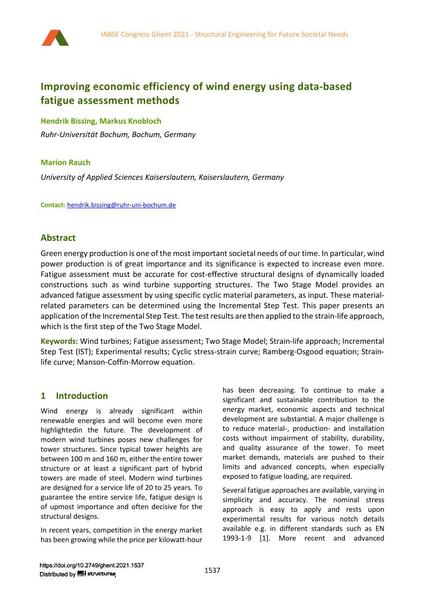Improving economic efficiency of wind energy using data-based fatigue assessment methods

|
|
|||||||||||
Bibliografische Angaben
| Autor(en): |
Hendrik Bissing
(Ruhr-Universität Bochum, Bochum, Germany)
Markus Knobloch (Ruhr-Universität Bochum, Bochum, Germany) Marion Rauch (University of Applied Sciences Kaiserslautern, Kaiserslautern, Germany) |
||||
|---|---|---|---|---|---|
| Medium: | Tagungsbeitrag | ||||
| Sprache(n): | Englisch | ||||
| Tagung: | IABSE Congress: Structural Engineering for Future Societal Needs, Ghent, Belgium, 22-24 September 2021 | ||||
| Veröffentlicht in: | IABSE Congress Ghent 2021 | ||||
|
|||||
| Seite(n): | 1537-1545 | ||||
| Anzahl der Seiten (im PDF): | 9 | ||||
| DOI: | 10.2749/ghent.2021.1537 | ||||
| Abstrakt: |
Green energy production is one of the most important societal needs of our time. In particular, wind power production is of great importance and its significance is expected to increase even more. Fatigue assessment must be accurate for cost-effective structural designs of dynamically loaded constructions such as wind turbine supporting structures. The Two Stage Model provides an advanced fatigue assessment by using specific cyclic material parameters, as input. These material- related parameters can be determined using the Incremental Step Test. This paper presents an application of the Incremental Step Test. The test results are then applied to the strain-life approach, which is the first step of the Two Stage Model. |
||||
| Stichwörter: |
Windkraftanlagen Ermüdungsnachweis
|
||||
| Copyright: | © 2021 International Association for Bridge and Structural Engineering (IABSE) | ||||
| Lizenz: | Die Urheberrechte (Copyright) für dieses Werk sind rechtlich geschützt. Es darf nicht ohne die Zustimmung des Autors/der Autorin oder Rechteinhabers/-in weiter benutzt werden. |
||||
